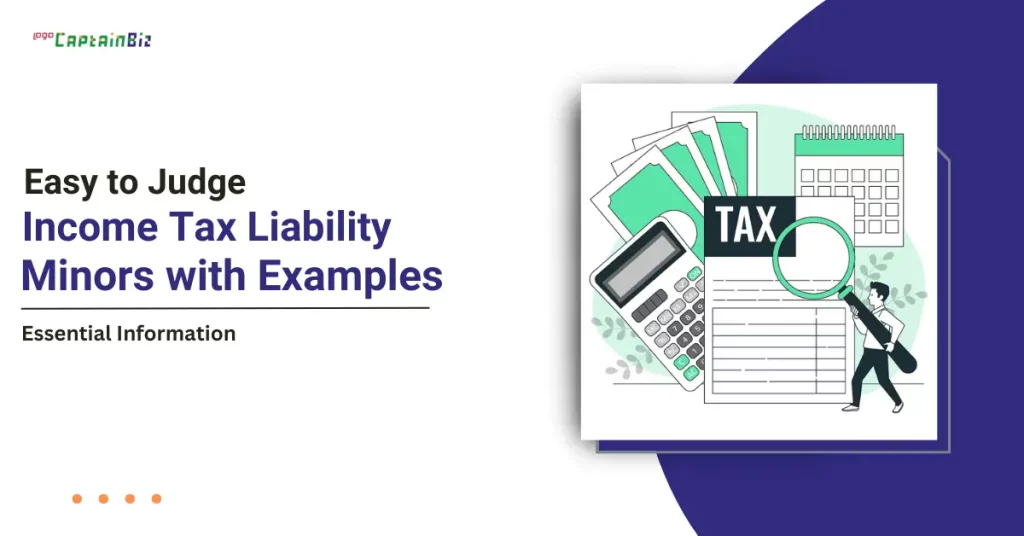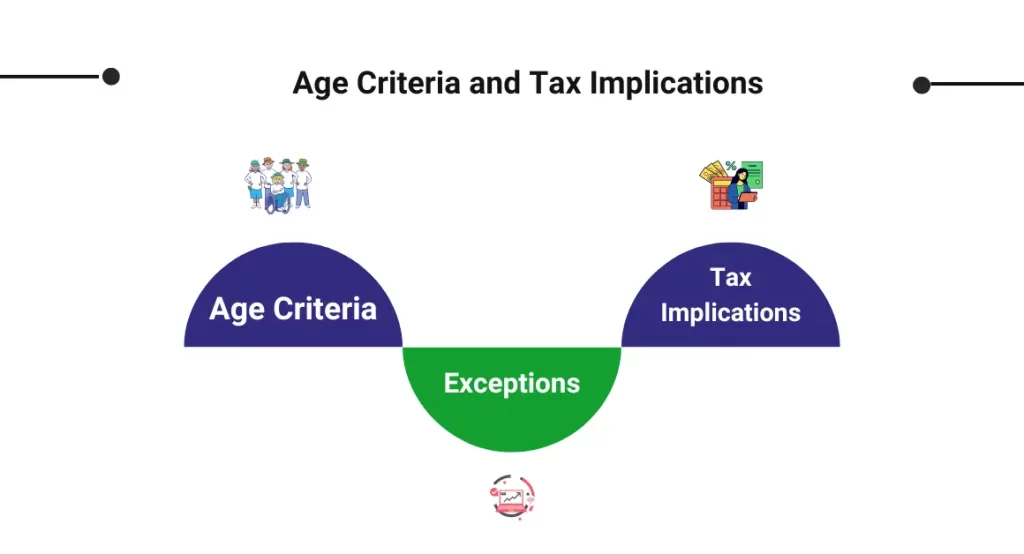Income tax is a fundamental aspect of the financial system, requiring individuals to contribute a portion of their earnings to the government. While the concept may seem straightforward, navigating income tax obligations can become more complex when considering minors—individuals under the age of 18. Minors, individuals who have not yet reached the age of majority, are not exempt from income tax obligations solely due to their age. However, the rules governing income tax for minors can differ significantly from those that apply to adults. While minors may earn income from sources such as part-time jobs, investments, or gifts, the treatment of this income for tax purposes can vary based on factors such as the amount earned, the source of income, and the minor’s dependency status.
Let’s explore with a hypothetical example to simplify understanding. Imagine a scenario where a son receives a gift of a fixed deposit valued at ₹12 lakh from her grandfather. This deposit yields an interest income of ₹90,000. Meanwhile, the daughter’s father earns ₹35 lakh annually, and her mother earns ₹30 lakh. If both parents are earners, the child’s income gets combined with the parent having the higher income. Hence, the daughter’s income of ₹90,000 gets added to her father’s earnings.
Minors may find themselves subject to income tax in various situations, such as earning income from a part-time job, receiving investment income, or inheriting assets. Additionally, minors who are self-employed or who operate a business may also have income tax obligations. Understanding when and how income tax applies to minors is essential for both young earners and their parents or guardians.
One key distinction between income tax for minors and adults lies in the standard deduction. While adults are entitled to claim a standard deduction or itemize deductions to reduce their taxable income, minors are subject to special rules that may limit their ability to claim certain deductions. Additionally, minors may be subject to the “kiddie tax,” which imposes higher tax rates on unearned income above a certain threshold.
Basics of Income Tax for Minors

Minors aren’t left out of paying income tax just because they’re young. However, there are special rules for them. These rules can affect things like how much money they can earn before they have to pay taxes and what types of income are taxed.
There are two types of money a kid can get: earned and unearned.
- Earned Money:
If a kid wins a prize from a TV show or sports game, or if they work a part-time job or run their own small business, that’s called earned money.
- Unearned Money:
If a kid gets money as a gift for their birthday or other celebrations from family and friends, that’s called unearned money.
If a kid (under 18 years old) makes money above a certain limit set by the government, their parent or guardian has to do some paperwork for them. It’s because there’s no rule saying kids can’t do taxes. If a kid makes more than ₹1500 every month, no matter how they make it, they have to do taxes. In this article, we’ll talk about when parents can do taxes for their kids.
Here are some important things kids should know before doing taxes:
- Some big words like gross earnings and taxable income should be explained to them.
- Kids need to sign their tax forms themselves.
- They should keep a record of what they earn and spend each year.
- They need to put their name and tax number correctly on the forms.
- Kids should know that tax info is private.
- It’s a good idea for kids to get help from a tax expert when doing taxes.
Age Criteria and Tax Implications

In India, the age criteria and tax implications for minors are governed by the Income Tax Act, 1961, and its related rules and regulations. Here’s how it works:
- Age Criteria:
In India, a minor is defined as an individual who has not yet reached the age of 18 years.
Once a person turns 18, they are considered a major for income tax purposes and are taxed accordingly.
- Tax Implications:
Minors are subject to income tax on their earnings, similar to adults.
The income earned by a minor is added to the income of the parent whose total income is higher, and it is taxed accordingly.
However, if the income of the minor arises from manual work done by them, or by their talent, then such income is clubbed with the parent whose income is lower.
Income earned by a minor child from any activity involving skill, talent, or specialized knowledge and experience, will not be clubbed with the income of the parent.
- Exceptions:
There are certain exemptions and deductions available to minors under the Income Tax Act. For example, minors are entitled to a basic exemption limit, similar to adults, below which their income is not taxable.
Additionally, income earned by minors from investments made on their behalf by their parents, up to a certain limit, may be tax-exempt under specific conditions.
Understanding these rules and regulations is essential for parents and guardians to ensure proper tax compliance regarding income earned by minors. It’s advisable to consult with a tax advisor or chartered accountant to navigate any complexities and ensure compliance with Indian tax laws.
Examples of Taxable and Non-Taxable Income for Minors
Taxable Income:
Let’s say 16-year-old Maya works part-time at a local grocery store and earns ₹5,000 per month. This money she earns from her job is considered taxable income because she worked for it. Maya needs to report this income and pay taxes on it.
Non-Taxable Income:
Now, imagine Maya’s grandparents give her ₹10,000 as a birthday gift. Since this money is a gift and Maya didn’t work for it, it’s considered non-taxable income. Maya doesn’t need to pay taxes on this money because it’s not from a job or work she did.
Reporting Requirements for Minors
When it comes to reporting their income to the tax authorities, minors have certain obligations they need to fulfill. Here’s what they typically need to do:
- Reporting Income: Minors need to report any income they earn, whether it’s from a part-time job, investments, or gifts, to the tax authorities.
- Filling Out Forms: Depending on the nature and amount of their income, minors may need to fill out specific forms for reporting their income. This could include forms such as:
- Form 1040: This is the standard income tax return form used by individuals to report their income to the IRS in the United States.
- Form 1040EZ: A simplified version of Form 1040, typically used by individuals with straightforward tax situations.
- Providing Accurate Information: Minors must ensure that the information provided on their tax forms is accurate and complete. This includes reporting all sources of income and any deductions or credits they may be eligible for.
- Submitting Tax Returns: Once the necessary forms are filled out, minors must submit their tax returns to the tax authorities by the specified deadline. In many cases, this deadline is April 15th of the following year for income earned in the previous tax year.
- Keeping Records: Minors should keep records of their income and any related expenses or deductions for reference purposes and in case they are audited by the tax authorities.
Strategies to Minimize Tax Liability for Minors
There are several strategies minors can use to minimize their tax liability. Here are some common ones:
- Utilize Tax-Advantaged Accounts: Minors can contribute to tax-saving investment options such as the Public Provident Fund (PPF) or Sukanya Samriddhi Yojana (SSY). These accounts offer tax benefits on contributions, accruals, and withdrawals, helping minors save on taxes over the long term.
- Take Advantage of Deductions and Credits: Minors can benefit from deductions available under Section 80C of the Income Tax Act, such as contributions to PPF, SSY, or payment of tuition fees. Additionally, they can utilize deductions for medical insurance premiums under Section 80D or for interest on education loans under Section 80E.
- Consider Income Shifting: Minors can leverage income splitting with parents or guardians to lower the overall family tax burden. Income earned by minors can be added to the income of the parent with lower taxable income, potentially reducing the family’s tax liability.
- Invest Wisely: Minors can invest in tax-saving instruments like Equity Linked Saving Schemes (ELSS), which offer tax benefits under Section 80C. They can also consider investing in tax-exempt securities like tax-free bonds or National Savings Certificate (NSC) to minimize tax liability on investment returns.
- Understand Kiddie Tax Rules: Minors subject to the “kiddie tax” provisions should be mindful of its impact. They may opt for investments generating primarily earned income, such as interest income from fixed deposits, to minimize the impact of higher tax rates on unearned income.
- Maximize Education Tax Benefits: Minors pursuing higher education can avail of education tax benefits, such as deductions for tuition fees under Section 80C or deductions for interest on education loans under Section 80E. These provisions help minors and their families reduce tax liability while investing in education.
- Consult a Tax Professional: It’s advisable for minors and their families to consult with a tax professional or financial advisor to devise tax-efficient strategies. A tax professional can provide guidance on maximizing available deductions, credits, and exemptions while ensuring compliance with Indian tax laws.
Conclusion:
In conclusion, understanding income tax for minors becomes straightforward. By understanding the basics, including age criteria and tax implications, determining taxable and non-taxable income becomes easier. Reporting requirements ensure compliance, while strategies to minimize tax liability offer valuable guidance. Overall, with accessible explanations and practical illustrations, navigating income tax for minors becomes a simpler task, empowering individuals to make informed decisions and manage their tax obligations effectively.
Also Read: How to Calculate GST in an Excel Sheet: Step-by-Step Guide
FAQ’s
-
What is income tax for minors?
Income tax for minors is the money they have to give to the government from the money they earn, just like grown-ups.
-
What are the age criteria for minors regarding income tax?
In India, minors are usually those under 18 years old.
-
Do minors have to pay income tax in India?
Yes, minors may have to pay income tax if they earn above a certain amount set by the government.
-
Can minors receive gifts without paying taxes?
Generally, gifts received by minors are not taxable as income under Indian tax laws.
-
What types of income are taxable for minors in India?
Taxable income for minors in India includes money earned from part-time jobs, interest from savings accounts, and winnings from competitions.
-
Do minors need to report their income to the tax authorities in India?
Yes, minors must report their income to the tax authorities in India if it exceeds the specified threshold set by the government.
-
What forms do minors need to fill out for reporting their income in India?
Minors may need to fill out tax forms such as ITR-1 or ITR-4, depending on their income sources and amount.
-
How can minors minimize their tax liability in India?
Minors in India can minimize tax liability by investing in tax-saving options like PPF, SSY, or ELSS, and by claiming deductions available under Section 80C of the Income Tax Act.
-
Can minors shift their income to lower their tax burden in India?
Yes, minors in India may shift income to lower-tax-bracket family members, such as parents, to reduce overall tax liability, as per Indian tax laws.
-
Should minors consult a tax professional for guidance in India?
Yes, it’s advisable for minors and their families in India to consult a tax professional or financial advisor for personalized tax advice and assistance, ensuring compliance with Indian tax laws.

